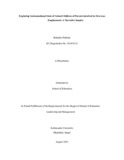
Please use this identifier to cite or link to this item:
https://hdl.handle.net/20.500.14301/552| Title: | Exploring Socioemotional State of School Children of Parents involved in Overseas Employment: A narrative Inquiry |
| Authors: | Pakhrin, Bahadur |
| Citation: | Pakhrin, B. (2025). Exploring socioemotional state of school children of parents involved in overseas employment: A narrative inquiry |
| Issue Date: | Aug-2025 |
| Publisher: | Kathmandu University School of Education |
| School: | SOED |
| Department: | DOEL |
| Level: | Masters |
| Program: | M.Ed. in Leadership and Management (Two Year Program) |
| Abstract: | This study explores the socioemotional experience of school children residing in Lalitpur district, whose one or both parents are engaged in overseas employment, leaving the children with secondary caregivers such as relatives or in hostels. Qualitative narrative inquiry research design with in-depth interviews of participants and ground observation were the means of data collection, where data was primarily collected from left-behind children, secondary caregivers and hostel warden. The selection of participants and area was purposive. This research revealed that prolong separation of parents and children affects the left behind children in multilayered ways. The collected data was thematize using Braun and Clarke’s (2006) six-steps of familiarization and eight major themes had emerged. The major themes are; motional vulnerability and loneliness, selective communication and emotional bonding, parent–child relationship disruption, behavioral and psychological shifts, educational and motivational impacts, detachment from culture and identity, struggles and strategies of secondary caregivers, and coping mechanisms and self-regulation. The findings after the analysis of the data were interpreted through (Bowlby's attachment theory, Vygotsky's sociocultural theory and Bronfenbrenner's Ecological System theory. The study directs that that while children adopt various coping strategies, the emotional gap caused by parental absence remains significant. The role of caregivers, schools, and policy-level interventions is crucial in supporting the socioemotional development of left-behind children. |
| URI: | https://hdl.handle.net/20.500.14301/552 |
| Appears in Collections: | Disertation |
Files in This Item:
| File | Description | Size | Format | |
|---|---|---|---|---|
| Bahadur_Final Report (Exploring Socioemotional state of school children, left behind due to parental overseas employment).pdf | 2.24 MB | Adobe PDF |  View/Open |
Items in DSpace are protected by copyright, with all rights reserved, unless otherwise indicated.